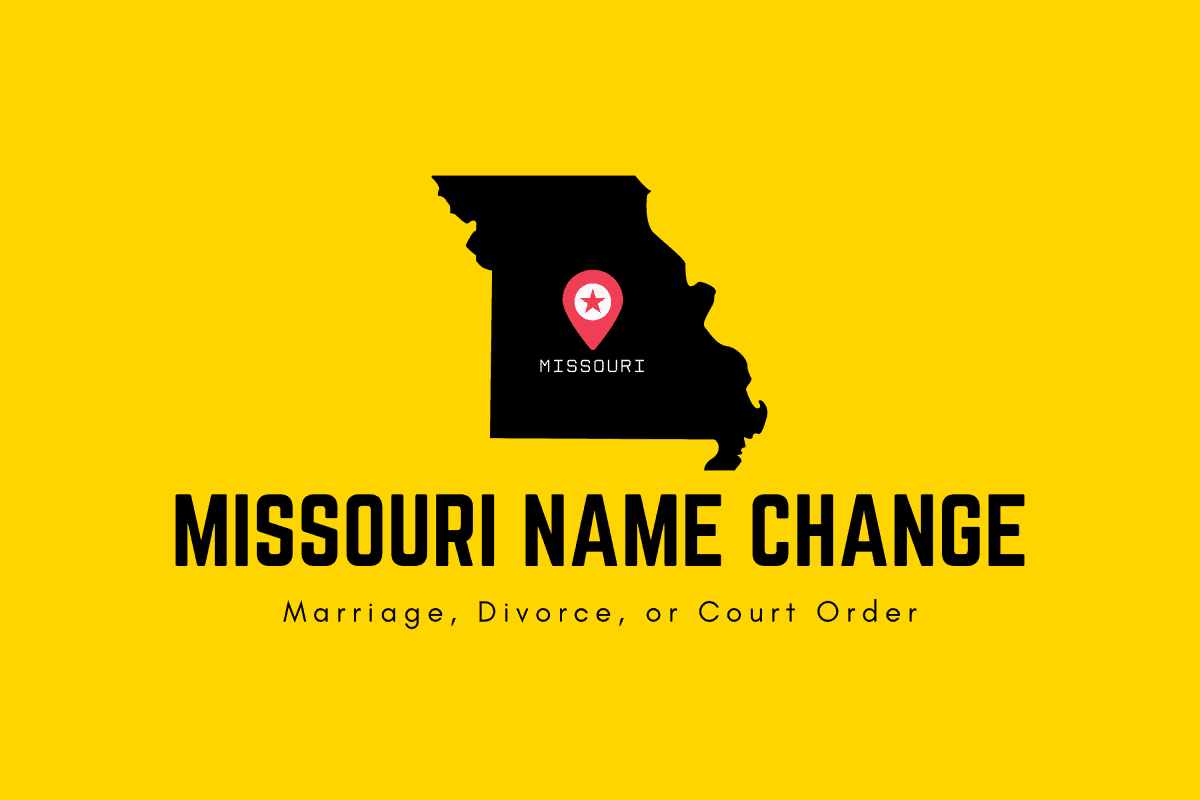A Complete Guide to Legal Name Change in Missouri

In the state of Missouri, pursuant to statute 527.270, residents are afforded the opportunity for a fresh start through a name change, whether for social, religious, personal, divorce, or marriage reasons. The procedure needn't be complex or slow, now that you've got this step-by-step guide to light your path.
Marriage name change
Legal name change is very simple when done through marriage. Before getting married, apply for a marriage license within any Missouri Recorder of Deeds office. They're often found in the county courthouse. Chapter 451 of Missouri's revised statues determines the state's marriage laws.
Getting your Missouri marriage license
A Missouri marriage license application is available all applicants: there is no Missouri residency requirement. License fees vary from one county to the other, but expect to pay around $50. (Give or take $10.) Every office takes cash, while fewer accept checks, money orders, and credit or debit cards. The latter two may incur a surcharge.
There's no waiting period before you receive your marriage license; it's given right away once they approve your application. You and your partner must come before the deeds recorder. Bring proof of identity showing your date of birth, such as a driver's license, state ID, or passport.
One applicant who's at least 18 years old may apply absentee in cases of active duty military status, incarceration, or disability. Whoever applies solo must bring the other's completed absentee verification form. You can pick up this free form at the recorder of deeds office.
There's no tail-end waiting period after you get your license; meaning you can get married without delay. Your license will stay valid for 30 days after issuance. If it expires, you must reapply and repay the license fee.
Adults 18 and older can marry without parental consent; minors require it. One custodial parent or legal guardian must grant consent for their child to marry in person or via notarized consent form (gotten from the county recorder's office). As of July 13, 2018, Missouri excludes anyone below age 16 from marrying.
Getting your Missouri marriage certificate
To change your last name after marriage, get married first and receive a certified marriage certificate after completion of the ceremony. Your marriage certificate is legal proof that your marriage is legal and recognized by the state. Request multiple certified copies so that you can change your last name with multiple agencies simultaneously.
Such proof of marriage kick-starts the name change process: notifying diverse governmental and nongovernmental bodies of the change, such as the Social Security Administration. Using a name change kit can simplify it further by bundling your forms and instructions.
Name change options
You can take another last name after marriage, depending on what suits your fancy. It's one of the first legal to-dos after marriage you'll confront. Here are your options…
1. Hyphenate names
You can put a hyphen between your spouse's name and yours. Hyphenating is a simple middle-ground approach if you don't want to give up too much or hurt your spouse's feelings and expectations.
2. Maiden to middle name change
You can make your maiden name your new middle name before taking your spouse's surname as your new last name. This is a positive way to preserve your premarital identity while honoring your spouse.
3. Taking wife's name
A husband taking his wife's last name in Missouri isn't possible through marriage. You'll need a general adult name change through the circuit court to carry this out. This restriction isn't unique to Missouri. Only a handful of states allow a man to change his last name to his wife's using the marriage certificate.
4. Leave your name unchanged
You can decide not to change anything and leave your name unchanged as it stands on your marriage license and certificate. This doesn't prevent you from changing your name later.
Divorce name change
You can get back any prior name once you realize you don't want to keep your married name. You need to ask the divorce court for your new name during your divorce proceeding. There are no additional fees for a divorce-approved name change; you're paying for that privilege through the dissolution filing fee.
Changing your name through divorce is your choice alone. Your ex-husband, ex-wife, or their new partner can't force you to revert. Designating a new name on your divorce certificate isn't binding; you can defer the change or ignore it without consequence.
Start by filling out a Petition for Dissolution of Marriage form. Tick the checkbox requesting a return to your chosen former name.
Your final divorce decree should have the judge's statement restoring your old name. Otherwise, get it straightened out. Court records can get revised and documents reissued for mistakes and typos. The right to change your name becomes official once the judge signs the final order and closes your case file.
Ask for a certified copies of your divorce decree from the court. It costs $15 per copy. This may come with an extra fee. The court may give you one certified copy without asking, as part of your filing fees. Your decree serves as proof of name change when contacting governmental and nongovernmental entities to update your name.
General adult name change
Missouri statute 527.270 gives every resident the chance to change their name as they deem fit, as long as their reasons are lawful. Missouri circuit courts handle name changes in the state. Start the process by visiting your county's circuit court and file a Petition for Change of Name form (PDF, 788 KB).
Complete and file the completed form with both your current name and the new name you want, reason for the change, birth date, and parents' names with their places of birth. If you have children, insert their names. Include your spouse's name if you're married.
It costs about $200 to file a name change petition through Missouri's circuit courts. Fees differ depending on the county where you live. Get your hearing date scheduled right away or by mail. Again, the steps differ somewhat depending on your county of residence.
Attend your name change hearing and answer the judge's questions with honesty on the reasons you're seeking a name change. It's not a trial or inquisition, so don't expect a grilling for your choice. The court is trying to weed out petitioners who're attempting to evade debts, commit fraud, or both. You're fine as long as your intentions are genuine.
After receiving the court order, get in touch with a local newspaper circulating within your county and ask them to run the required notice in their publication for name change purposes. Supply them the order date, issuing court, and current and future name. Make sure they schedule the notice to run three times in the next 20 days. The publication will alert the court of your compliance once your advert has run the stipulated time-span.
If your county lacks a newspaper, you can publish your notice in a neighboring county's newspaper. If surrounding counties also lack press, any St. Louis newspaper can fulfill this requirement.
You'll get your approved court order soon after the advert runs its course. Take your order and hit the ground running: get an updated social security card, passport, and Missouri driver's license or and state ID card.
Name change on birth certificate
Contact the Missouri Bureau of Vital Records to change the name on your birth certificate. Make sure you have a legal name change document provided by the court and other required documents such as photo identification and a proof of U.S. citizenship, in case they ask for such details.
You can't change the name on your birth certificate through marriage or divorce. It's only meant for court-petitioned adult or minor name changes.
Update identification with governmental agencies
Approach the Social Security Administration office to update the name on your new social security card. You can file at any local SSA office, by mail or in person. You'll get a new social security card by mail that shows your new last name, but you'll keep the same number.
Get a new driver's license or REAL ID
Next, approach the Missouri Department of Revenue (DOR) to have your REAL ID or Missouri driver's license updated in person. Bring your current driver's license, name change document, fee, and proof of your place and date of birth, social security number, and Missouri address. Prepare to take a new photo.
Get a new passport correction or renewal
To obtain a new passport in Missouri, you'll first need to fill out the passport renewal form provided by the State Department. Make sure to include a color passport photo that meets the specified requirements, as this will be needed for both the application and any necessary corrections to your current passport.
Once everything is completed, submit the form along with your current passport and passport photo for processing. Keep in mind that if any changes are required, such as updating your name, additional documentation may be necessary. If this is your first time applying for a passport, you'll need to file in person via form DS-11 at a passport acceptance agency.
Non-governmental institutions name change
After updating your major federal and state credentials, remember to also reach out to nongovernmental offices, such as insurance providers, banks, credit card companies, and other fiscal institutions, as well as your employer, membership clubs, and voter registration offices.
And don't forget to update your vehicle title, professional documents and diplomas, and any other relevant records. You typically won't need to provide a certified copy of your name change document to this group; a photocopy proof should suffice.

My marriage certificate has shows my maiden name. I'm not sure how to change it to my husband's. I don't remember them asking me when doing the application. Is this a problem?
Hi Francesca. You're right not to remember the application asking for your married name, because it didn't exist. Only your current name and birth name would have been asked.